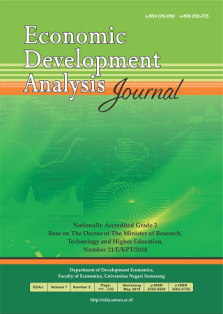Does Corruption Hinder Economic Growth? A Simultaneous Analysis
Abstract
Corruption has a causal relationship with economic growth that economists have long studied. This study aims to determine the causal relationship between corruption and economic growth, the effects of human development and good governance on corruption, and the effect of investment, labor force, and the use of technology on economic growth. The data used is panel data consisting of 43 Asian countries in 2012-2022, which were analyzed using Two-Stage Least Squares (2SLS). This study found that corruption and economic growth have a positive causal relationship, thus supporting the theory of Sand the Wheel that corruption hinders economic growth in Asian countries except Central Asia, and the determinants of corruption and economic growth have varying effects in the Asian region. This study provides information for stakeholders to develop policies that encourage economic growth by prioritizing human development, creating good governance, and increasing physical capital, human capital, and technology adoption.


